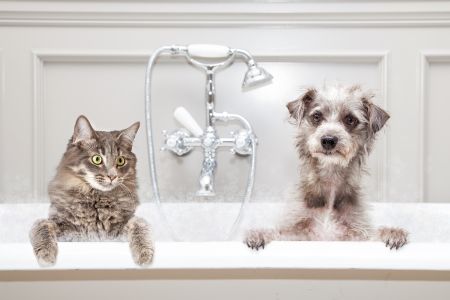Grooming for Dogs
While the specifics vary depending on each pet's needs, basic grooming for dogs usually includes bathing, brushing, nail trimming, and (depending on the breed) haircuts.
Bathing
Bathing helps remove dirt and debris from your dogs coat, and keep their skin healthy. However, bathing your dog too often can irritate the skin, damage hair follicles, and increase the risk of bacterial or fungal infections.
For most dogs, bathing frequency should be between once a month and once every three months. Use a shampoo formulated specifically for dogs, and water that is warm, but not warmer than the dog's skin.
Brushing
Brushing helps prevent skin irritation and matting by removing dead hair from your dog’s coat. It also helps reduce the amount of dog hair around the house – a perpetual battle that most dog owners are familiar with!
The longer your dog’s hair is, the more frequently it will need to be brushed. Some dogs need to be brushed daily, while others can be brushed once a month.
Nail Trimming
To trim your dog's nails, use a clipper designed specifically for dogs' nails. A rotary trimmer can be a safer alternative, but it can take more time. If you’re not comfortable trimming your dog's nails yourself (or if you dog won't tolerate it), consider having it done by a qualified professional.
Haircuts
Different breeds have different needs when it comes to haircuts. Talk to your vet or a professional groomer to find out exactly how often (or if at all) your dog needs haircuts, and how best to go about it.
To cut your dog's hair, bathe them first using good quality dog shampoo, and then towel dry and brush. Use sharp scissors to trim the fur around the face and feet, and electric clippers for the rest of the body.
Grooming for Cats
Grooming for cats usually involves brushing, bathing, nail and paw care, ear care, dental care, and eye care.
Brushing
Brushing your cat removes dirt, grease, skin flakes and dead hair from the coat, and it helps to stimulates blood circulation and improve overall skin condition as well.
Brush your kitty once or twice a week with a metal comb (thick or thin teeth are both fine, whatever works best). You’ll find that these regular brushing sessions are particularly beneficial as your cat ages and can't groom as meticulously anymore.
Bathing
It's no secret that most cats hate water, and you'll be pleased to learn that most cats do not need to be bathed on a regular basis. Cats can more or less take care of their own grooming, and will only need help if they get particularly filthy, or get into something sticky.
Bathe your cat using special cat shampoo and warm, but not hot water. Keep in mind that there's a good chance your cat will not want to cooperate, so be sure to shut the bathroom door before you begin, and consider wearing gloves and long sleeves.
Nail & Paw Care
It’s important to regularly examine and clean your cat’s paws and make sure they’re wound-free, and free of debris.
Trimming cat's nails can reduce scratching, and mitigate the destruction of your soft furnishings. For cats that are unwilling to tolerate nail trimming, spending some time getting them used it their paws being touched (without trimming) can help.

Looking for a vet in Cordova and greater Memphis area?
We're always accepting new patients, so contact our veterinary hospital today to book your pet's first appointment.
Related Articles View All
Cats & Colds: Can They Get Them & What To Do?
Many people don't know that our cats can get sick, but they can catch colds just like we can! A cat with a cold will display similar symptoms as humans do such as sneezing and a runny nose. Here, our Cordova vets talk about the causes of cat colds and when to seek veterinary care.
Do cats get depressed?
Cats are known for their independent yet playful characters. So, if your cat seems sad, you're bound to be concerned. Today, we discuss signs of depression in cats, potential causes of cat depression, and what can be done to help your feline friend banish the blues.
My cat sleeps constantly, should I be worried?
No doubt about it, cats love to sleep. But how much is too much? Today, you will discover reasons why cats sleep so much and learn when to be concerned about your cat's sleeping habits.
What To Do If Your Cat or Dog Having Difficulty Breathing
Does your cat or dog's panting mean that they're having breathing difficulties? Today, our Cordova vets look at breathing difficulties in dogs and cats, and how they are treated.

